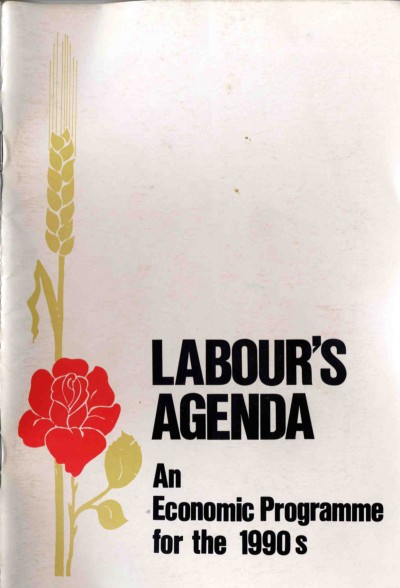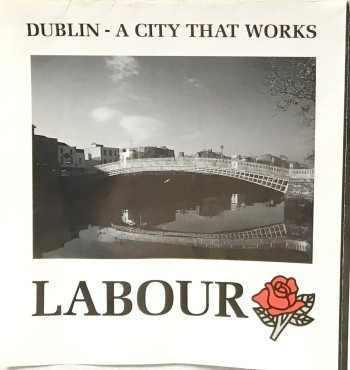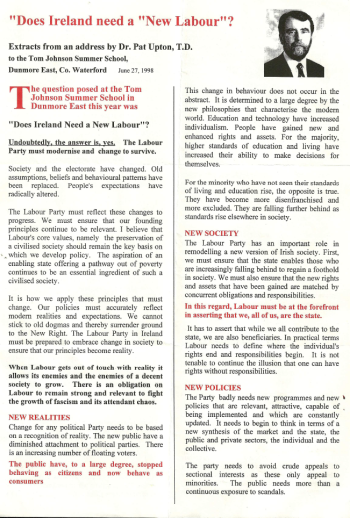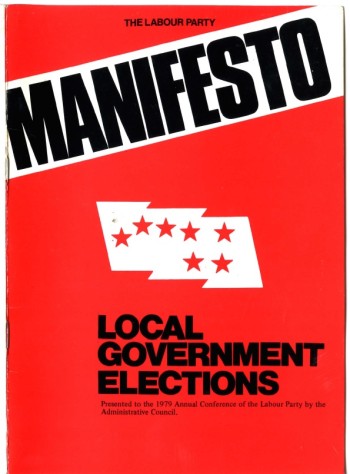Labour's Agenda: An Economic Programme for the 1990s

| Date: | 1989 |
|---|---|
| Organisation: | Labour |
| View: | View Document |
| Discuss: | Comments on this document |
| Subjects: |
Please note: The Irish Left Archive is provided as a non-commercial historical resource, open to all, and has reproduced this document as an accessible digital reference. Copyright remains with its original authors. If used on other sites, we would appreciate a link back and reference to The Irish Left Archive, in addition to the original creators. For re-publication, commercial, or other uses, please contact the original owners. If documents provided to The Irish Left Archive have been created for or added to other online archives, please inform us so sources can be credited.
Commentary From The Cedar Lounge Revolution
14th February 2011
This document dating from the late 1980s provides a timely insight into the developing economic programme of the Labour Party during that period. 38 pages long, this was produced on foot of a motion at the National Conference of the party to:
...formulate a socialist alternative strategy to the policies pursued by successive Governments which place the burden on labour as opposed to capital.
Members of the Committee charged with formulating this strategy included Ruairi Quinn, Joan Burton and Michael D Higgins as well as four union representatives.
The document engages with a broad range of areas, including the European Community, Democratic Economic Planning, State Grant Aid, Public Enterprise, Reforming Taxation Incentives, Labour Market policies and Employment policies.
There is an outline of 'Guiding Principles of Socialist tax policy'. Also interesting to see is a section on 'Promoting Third World Development'.
The preamble states that:
This document sets out Labour's medium term economic strategy. It indicates a policy direction which, if pursued nationally, would lead to significantly higher output and employment in the economy. Further, it proposes fundamental reforms to our tax system which would both improve incentives for employment creation and provide greater equity in the incidence of taxation.
It explicitly argues that this is 'Policy located in Ideology'.
Policy development in the LP does not take place in an ideological vacuum. A belief in the basic values of liberty, equality and fraternity underlines Labour's vision of society. Policy is the attempt to give expression to these values in the contemporary setting.
And further:
In the 1980s, Ireland has witnessed the emergence of a consensus of the Right that sees the economy as separate form the daily experience of those who are treated unequally, who are exploited, who are excluded. What has emerged is a view of a depeopled economy. There has also been a unique attack on the role of the State as a source of innovation in production, as a levelling mechanism, or indeed as a comprehensive provider of basic needs in the area of housing, health, education, or social welfare - to mention but a few areas.
And a good summation here:
There has been an emphasis on the curtailment of democracy through the placing of blocks on citizen participation, and the discouragement of political education which might have led to more widespread economic literacy. The economics of the Right has been presented as neutral, the problem of the economy as one of management
And it concludes by arguing that voters are 'invited to choose between a politics of mutual support and a politics of radical individual greed'.
In terms of content the document is open in recognising certain constraints, as with 'the structure of the Government finances, and in particular the size and interest servicing costs of the National Debt..the small and open characteristics of the Irish economy which limits the value of any general reflationary policy... EC laws, decisions and practices and the left/right political struggle in that framework'.
But it also presciently notes that while 'the national debt cannot be wished away, the LP will not allow its policy options to be constrained by excessive caution'. And it notes that 'the reality is that for the next five to ten yars the debt will remain at a relatively high level... Sustained growth will, of course, lessen the debt problem and Labour's policies are geared to that end'.
There's much more to consider in this document, not least the argument for the necessity of widening the Tax Base, and indeed there are many aspects that have a much more contemporary ring to them, not least 13.45 on printed page 62 [PDF page 33] or the mention of Third Level education on the following page which envisages a strengthening of grants to encourage lower income take up.



![Gilmore Speaks Out [Extract from South Dublin Life & Leisure, 27th December 2000]](/image/1/350/0/images/covers/eglp.jpg)
Comments
No Comments yet.
Add a Comment
Comments can be formatted in Markdown format . Use the toolbar to apply the correct syntax to your comment. The basic formats are:
**Bold text**
Bold text
_Italic text_
Italic text
[A link](http://www.example.com)
A link
You can join this discussion on The Cedar Lounge Revolution
By: Tweets that mention Left Archive: Labour’s Agenda – An Economic Programme for the 1990s, Irish Labour Party, c.1989 « The Cedar Lounge Revolution -- Topsy.com Mon, 14 Feb 2011 08:36:06
[…] This post was mentioned on Twitter by Northern Ireland, Campaigntrail.ie. Campaigntrail.ie said: Left Archive: Labour’s Agenda – An Economic Programme for the 1990s, Irish Labour Party, c.1989: This document … http://bit.ly/g1gKcv […]
Reply on the CLR
By: Michael Taft Tue, 15 Feb 2011 09:25:48
There are three notable things about this document that could be contrasted to today. First, that it was published. There was a time when it was deemed important to produce a narrative, tell a story about the economy. Labour’s agenda did that. Second, was the manner of the formulation – a committee made up of TDs, NEC members and members from affiliated trade unions. This was a collective, inclusive effort drawing upon all strands of the party.
Third was the focus of the programme – which was to invest and create enterprises, in both the public and private sectors. This was an economy-building programme: use of structural funds, employee investment funds, economic planning, refocusing of state aid, public enterprise, labour market strategies, working time strategies, worker co-operatives, and economic democracy and participation. There was a confidence and belief that economic problems could be resolved collectively within the public realm.
Now compare that to today.
Of course, the document was of its time and there were limitations. Also, the reference to reflationary policies shouldn’t be confused. At that time, ‘reflation’ was tainted by Fianna Fail’s recent ‘vulgar Keynesianism’ which saw a pump-priming through Government consumption in the hope that it would stimulate indigenous enterprise. This was both a bad reading of the economy and a disaster. Labour’s Agenda, however, took the better approach to growing the economy – through investment and enterprise development.
All in all, it was a credible, serious effort to get to grips with an economy which, at that time, was producing only unemployment and emigration. There is much that Labour and the Left could learn from the principles contained in the document.
Reply on the CLR
By: Neues aus den Archiven der radikalen (und nicht so radikalen) Linken « Entdinglichung Wed, 16 Feb 2011 09:34:14
[…] Irish Labour Party: Labour’s Agenda – An Economic Programme for the 1990s […]
Reply on the CLR